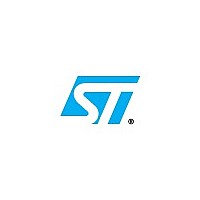ST92150JDV1QAuto STMicroelectronics, ST92150JDV1QAuto Datasheet - Page 105

ST92150JDV1QAuto
Manufacturer Part Number
ST92150JDV1QAuto
Description
8/16-bit single voltage Flash MCU family with RAM, E3 TM(emulated EEPROM), CAN 2.0B and J1850 BLPD
Manufacturer
STMicroelectronics
Datasheet
1.ST92150JDV1QAUTO.pdf
(430 pages)
Specifications of ST92150JDV1QAuto
Internal Memory
Single Voltage FLASH up to 256 Kbytes, RAM up to 8Kbytes, 1K byte E3 TM (Emulated EEPROM)
Minimum Instruction Time
83 ns (24 MHz int. clock)
- Current page: 105 of 430
- Download datasheet (7Mb)
Figure 54. Top Level Interrupt Structure
n
n
5.10 INTERRUPT RESPONSE TIME
The interrupt arbitration protocol functions com-
pletely asynchronously from instruction flow and
requires 5 clock cycles. One more CPUCLK cycle
is required when an interrupt is acknowledged.
Requests are sampled every 5 CPUCLK cycles.
If the interrupt request comes from an external pin,
the trigger event must occur a minimum of one
INTCLK cycle before the sampling time.
When an arbitration results in an interrupt request
being generated, the interrupt logic checks if the
current instruction (which could be at any stage of
execution) can be safely aborted; if this is the
case, instruction execution is terminated immedi-
ately and the interrupt request is serviced; if not,
the CPU waits until the current instruction is termi-
nated and then services the request. Instruction
execution can normally be aborted provided no
write operation has been performed.
For an interrupt deriving from an external interrupt
channel, the response time between a user event
and the start of the interrupt service routine can
range from a minimum of 26 clock cycles to a max-
imum of 55 clock cycles (DIV instruction), 53 clock
NMI
TLNM
WATCHDOG ENABLE
IEN
TLI
WATCHDOG TIMER
END OF COUNT
WDGEN
TLTEV
OR
ST92124xxx-Auto/150xxxxx-Auto/250xxxx-Auto
MUX
TLIS
cycles (DIVWS and MUL instructions) or 49 for
other instructions.
For a non-maskable Top Level interrupt, the re-
sponse time between a user event and the start of
the interrupt service routine can range from a min-
imum of 22 clock cycles to a maximum of 51 clock
cycles (DIV instruction), 49 clock cycles (DIVWS
and MUL instructions) or 45 for other instructions.
In order to guarantee edge detection, input signals
must be kept low/high for a minimum of one
INTCLK cycle.
An interrupt machine cycle requires a basic 18 in-
ternal clock cycles (CPUCLK), to which must be
added a further 2 clock cycles if the stack is in the
Register File. 2 more clock cycles must further be
added if the CSR is pushed (ENCSR =1).
The interrupt machine cycle duration forms part of
the two examples of interrupt response time previ-
ously quoted; it includes the time required to push
values on the stack, as well as interrupt vector
handling.
In Wait for Interrupt mode, a further cycle is re-
quired as wake-up delay.
TLIP
PENDING
MASK
TOP LEVEL
RESET
INTERRUPT
CORE
REQUEST
VA00294
105/430
9
Related parts for ST92150JDV1QAuto
Image
Part Number
Description
Manufacturer
Datasheet
Request
R

Part Number:
Description:
8/16-BIT SINGLE VOLTAGE FLASH MCU FAMILY WITH RAM / E3 TMEMULATED EEPROM / CAN 2.0B AND J1850 BLPD
Manufacturer:
ST Microelectronics
Datasheet:

Part Number:
Description:
STMicroelectronics [RIPPLE-CARRY BINARY COUNTER/DIVIDERS]
Manufacturer:
STMicroelectronics
Datasheet:

Part Number:
Description:
STMicroelectronics [LIQUID-CRYSTAL DISPLAY DRIVERS]
Manufacturer:
STMicroelectronics
Datasheet:

Part Number:
Description:
BOARD EVAL FOR MEMS SENSORS
Manufacturer:
STMicroelectronics
Datasheet:

Part Number:
Description:
NPN TRANSISTOR POWER MODULE
Manufacturer:
STMicroelectronics
Datasheet:

Part Number:
Description:
TURBOSWITCH ULTRA-FAST HIGH VOLTAGE DIODE
Manufacturer:
STMicroelectronics
Datasheet:

Part Number:
Description:
Manufacturer:
STMicroelectronics
Datasheet:

Part Number:
Description:
DIODE / SCR MODULE
Manufacturer:
STMicroelectronics
Datasheet:

Part Number:
Description:
DIODE / SCR MODULE
Manufacturer:
STMicroelectronics
Datasheet:

Part Number:
Description:
Search -----> STE16N100
Manufacturer:
STMicroelectronics
Datasheet:

Part Number:
Description:
Search ---> STE53NA50
Manufacturer:
STMicroelectronics
Datasheet:

Part Number:
Description:
NPN Transistor Power Module
Manufacturer:
STMicroelectronics
Datasheet:










